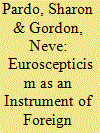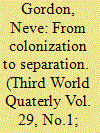|
|
|
Sort Order |
|
|
|
Items / Page
|
|
|
|
|
|
|
| Srl | Item |
| 1 |
ID:
155898


|
|
|
|
|
| Summary/Abstract |
The struggle between Zionists and Palestinian Bedouin over land in the Negev/Naqab has lasted at least a century. Notwithstanding the state’s continuing efforts to concentrate the Bedouin population within a small swath of land, scholars have documented how the Bedouin have adopted their own means of resistance, including different practices of sumud. In this paper we maintain, however, that by focusing on planning policies and the spatio-legal mechanisms deployed by the state to expropriate Bedouin land, one overlooks additional technologies and processes that have had a significant impact on the social production of space in the Negev. One such site is the struggle over the right to education, which, as we show, is intricately tied to the organization of space and the population inhabiting that space. We illustrate how the right to education has been utilized as an instrument of tacit displacement deployed to relocate and concentrate the Bedouin population in planned governmental towns. Simultaneously, however, we show how Bedouin activists have continuously invoked the right to education, using it as a tool for reinforcing their sumud. The struggle for education in the Israeli Negev is, in other words, an integral part of the struggle for and over land.
|
|
|
|
|
|
|
|
|
|
|
|
|
|
|
|
| 2 |
ID:
136429


|
|
|
|
|
| Summary/Abstract |
This article describes the rules of origin dispute between the European Union and Israel, and argues that these technical customs rules are also instruments of foreign policy. Although the rules have had no direct impact on Israel's industry in the Occupied Territories, they have bolstered the European Union's self-identification as a “normative power” while constituting an important legal precedent that has served to legitimize other actions against Israel's occupation
|
|
|
|
|
|
|
|
|
|
|
|
|
|
|
|
| 3 |
ID:
169454


|
|
|
|
|
| Summary/Abstract |
This article advances three arguments about Euroscepticism. First, using Israel as a case study we describe its alliances with Eurosceptic political actors, claiming that while each side hopes to benefit from these alliances to advance particular interests, the attraction among the actors are based on ideological affinities that do not align with the norms informing EU policies. If these norms become more contested, it may make it more difficult to construct a ‘normative power’-based approach in EU foreign policy. Second, we reveal how third parties can use Euroscepticism as an instrument for shaping EU foreign policy. Finally, we expose how this strategy produces a political paradox. By allowing itself to become an instrument deployed by a third party, the Eurosceptic member state also agrees to be pushed back into the fold of the EU apparatus, thus reconstituting itself as an internal actor, one which has stakes in the process and is willing to play by the rules of the game.
|
|
|
|
|
|
|
|
|
|
|
|
|
|
|
|
| 4 |
ID:
081212


|
|
|
|
|
| Publication |
2008.
|
| Summary/Abstract |
Much has changed during Israel's 40 years of occupation of Palestinian territory. Within the past six years Israel has, on average, killed more Palestinians per year than it killed during the first 20 years of occupation. Those who help manufacture public opinion within Israel claim that the dramatic increase in Palestinian deaths results from the fact that the Palestinians have changed the methods of violence they employ against Israel, and that Israel, in turn, has also begun using more violent means. Palestinians might invert this argument, claiming that they have altered their methods of resistance in response to Israel's use of more lethal violence. While such explanations no doubt contain a grain of truth, they are symptomatic accounts, and do little to reveal the root causes underlying the processes leading to the substantial increase in human deaths. A different approach is therefore needed, one that takes into account the structural dimension of Israel's military rule and tracks the two major principles that have informed the occupation over the past four decades: the colonisation principle and the separation principle. By the colonisation principle I mean a form of government whereby the coloniser attempts to manage the lives of the colonised inhabitants while exploiting the captured territory's resources. By the separation principle I do not mean a withdrawal of Israeli power from the Occupied Territories, but rather the reorganisation of power in the territories in order to continue controlling the resources. The major difference, then, between the colonisation and the separation principles is that, under the first principle there is an effort to manage the population and its resources, even though the two are separated. With the adoption of the separation principle Israel looses all interest in the lives of the Palestinian inhabitants and focuses solely on the occupied resources. Such a reorganisation of power helps explain the change in the repertoires of violence and the dramatic increase in the number of Palestinian deaths
|
|
|
|
|
|
|
|
|
|
|
|
|
|
|
|
| 5 |
ID:
144985


|
|
|
|
|
| Summary/Abstract |
The article examines the European Union’s (EU) normative position regarding the Israeli-Palestinian conflict to advance three interrelated claims. First, that EU member states subscribe to a unified normative position because the normative sphere is cut off from the economic sphere. Second, that this separation facilitates the uniformity of the normative position but hinders the possibility of asserting some form of conditionality which might encourage the diffusion of Ian Manners’ five core norms. Finally, that normative power Europe is a practice of discursive representation deployed not so much to exert influence on the Other, but rather to help consolidate the European Union as a united actor.
|
|
|
|
|
|
|
|
|
|
|
|
|
|
|
|
| 6 |
ID:
085316


|
|
|
|
|
| Publication |
2008.
|
| Summary/Abstract |
Focusing on the flow of funding to human rights non-governmental organizations (NGOs), we begin in this article to broach one of the least studied issues pertaining to transnational regimes-namely, their material underpinnings. Through an analysis of the patterns of donor funding to human rights NGOs, we underscore the triangulation between states, donors, and rights NGOs, whereby states have an impact on donor preferences, which, in turn, influences the agenda of human rights NGOs and their modes of operation, and these, in their turn, help shape the kind of NGO criticism voiced against the state. By emphasizing the important and frequently missing link of donors, we thus complicate the discussion concerning the impact human rights networks have on state policies and practices, showing how rights NGOs simultaneously weaken and strengthen the state. Accordingly, our examination of the political economy of human rights adds a new dimension to the literature analyzing how the state both reconfigures and is reconfigured by transnational regimes.
|
|
|
|
|
|
|
|
|
|
|
|
|
|
|
|
| 7 |
ID:
121448


|
|
|
|
|
| Publication |
2012.
|
| Summary/Abstract |
This essay analyzes the impact of Israeli unilateralism-specifically that of its settlement project-on the two-state solution. After exploring the relationship between unilateralism and power, the authors show, inter alia, that in-migration has accounted for about half the settlement growth since the international embrace of the land-for-peace formula in 1991, that the level of in-migration does not fluctuate according to government composition (right or left), and that Israeli-Palestinian negotiations have spurred rather than inhibited settlement expansion. The essay is framed by a contrast with the Palestinian bid for full UN membership, rejected as unilateralism by the Western powers but in fact aimed at undercutting Israeli unilateralism and creating the conditions for meaningful negotiations.
|
|
|
|
|
|
|
|
|
|
|
|
|
|
|
|
|
|
|
|
|